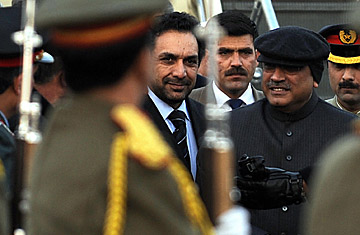
Afghan Vice President Ahmed Zia Massood (left) meets Pakistani President Asif Ali Zardari upon his arrival at the Kabul International Airport on January 6, 2009.
The diplomat, based in Kabul, was practical when describing the fallout from the latest Wikileaks document dump — a massive cache of frank American diplomatic cables never meant for public dissemination. "I was just telling [U.S.] Ambassador Karl Eikenberry that I feel it is more secure to talk to a foreign correspondent than to him. Because if I tell a journalist something is off-the-record, it will be. But if I say something sensitive to Eikenberry he will have to report it. And now we know that those reports can be leaked. So the trust is gone." The diplomat asked not to be named.
It is not the first time, of course, the Wikileaks documents involve Afghanistan. This time, however, the revelations are far less Afghan-centric than the material released this past summer, which included sobering battlefield assessments that called into the question the Pentagon narrative of the war's trajectory at a critical juncture. This time around, the main concerns that have emerged point to ham-fisted corruption in President Hamid Karzai's inner circle — hardly a revelation and certainly no surprise to anyone who has been following Afghan politics in recent years.
Of the more than quarter-million American documents made public over the weekend, the one that is perhaps most likely cause a stir on the Afghan street describes how authorities in Dubai working with the U.S. Drug Enforcement Administration discovered that Afghanistan's former vice president, Ahmed Zia Massood, was carrying $52 million in cash on a trip to the gulf city-state last year. The cable, from the U.S. embassy in Kabul, notes that Massood was allowed to keep the money without revealing its "origin or destination." But Dubai has become a byword for dirty dealings in Afghanistan, in part because of a banking scandal over the summer. Officials with close connections to the Karzai administration allegedly made toxic investments in Dubai using tens of millions of dollars of depositor money. That precipitated a days-long bank run.
Given that similar allegations have gone uninvestigated, observers here reckon the Massood disclosure may provide some fodder to domestic media with anti-Karzai agendas, and not much more. Fawzia Kofi, an MP from Badakhshan province, says the "relevant authorities [are reluctant] to put themselves at risk" and crack down — out of fear or greed. "We don't have executive power, we just talk," she says, referring to the debates over corruption in parliament that lead nowhere. "This may rekindle the whole story about money smuggling to Dubai," says Masood Farivar, manager of Salam Watandar, a national radio network. "It will probably make the front-page of some newspapers here, but I don't think it's going to explode."
The same can be said of documents that paint Ahmed Wali Karzai, the president's half-brother and head of the Kandahar provincial council, in a dubious light. The newly-released cables highlight the political charades in a pair of meetings with American officials wary of his reputation. One document recounts how he tried to win over his interlocutors with reminiscences from his days as a Chicago restaurant owner; it was, however, punctuated by a sharp reminder that Karzai is "understood to be corrupt and a narcotics trafficker" — not a new charge but one that the president's sibling consistently denies. He "appears not to understand the level of our knowledge of his activities," the author writes in a follow-up, recommending more pressure be applied. Yet Karzai remains entrenched as a local power-broker, despite a raft of media reports sourced to U.S. civilian and military officials alleging his illicit dealings and their harmful effects on efforts to cultivate government support in Kandahar, a Taliban stronghold.
Indeed, a failure to clean up his own house is one of the reasons why President Hamid Karzai was dismissed in one of the leaked cables as an "extremely weak" leader who is "driven by paranoia." Under normal circumstances, these might amount to fighting words. But the relationship between the U.S. Embassy and his administration is openly fractious — and so the comments seem to be part of the same litany of complaints by American officials, including Ambassador Eikenberry. "Such comments are not new," President Karzai's spokesman, Waheed Omer, told reporters on Monday, before assuring them that the leaks "won't have any impact on the strategic relations between the U.S. and Afghanistan."
American diplomats nonetheless kicked into full damage control mode. Ambassador Eikenberry condemned the WikiLeaks publication, saying their release "poses real risks to real people" as other U.S. officials have insisted in the past. He stressed that internal cables are not a full representation of a government's foreign policy, highlighting President Obama's speech at the NATO conference in Lisbon last week where he reaffirmed his long-term support for Afghanistan. "Our shared goals do not change based on the release of purported diplomatic reporting from the past," the envoy said. Trouble is, some of the grim assessments are just months old, not years. And in the meantime, conditions on the ground have grown worse, not better. With reporting by Aryn Baker / Kabul
